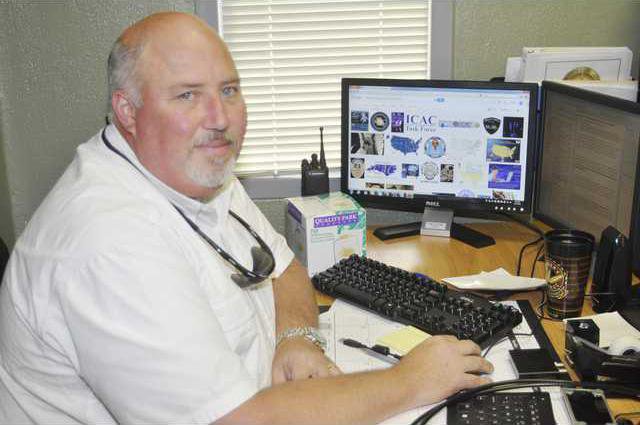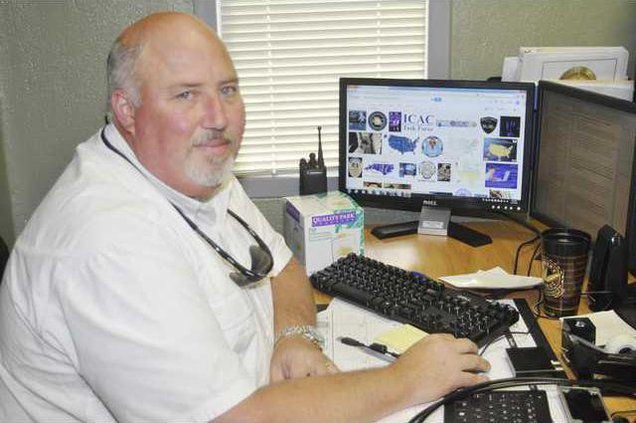Some of the images Joe Heath comes across online are so disturbing, he doesn’t understand why anyone would want to see them.
Heath, an investigator with the Effingham County Sheriff’s Office, helps catch criminals who produce, view and distribute photos and videos of child pornography across the Internet.
“There are certain videos that you really hate to see show up, because they are just so disturbing,” Heath said. “But you have to use that to kind of motivate you to keep going a little stronger.”
Heath heads up the ECSO’s involvement in the Internet Crimes Against Children Task Force. The ICAC Task Force is a nationwide network of law enforcement agencies devoted to investigating and apprehending people who use the Internet and other communications systems to sexually exploit children.
The time he spends at his computer “could range anywhere from 25 to 65 hours a week,” he said, depending on how many and what type of cases the ECSO is working.
Along with tracking computer users who are viewing or distributing child pornography, Heath monitors chat rooms for people who are trying to arrange sexual encounters with children. Heath impersonates online a minor to set a trap for the offender.
For example, a Vidalia man used his Web cam to send obscene material to what he thought was a 13-year-old girl. He was sentenced in July to seven years in prison and three years of probation.
In another case, a Savannah man was arrested in September for soliciting to have sex with a 5-year-old. Effingham County Sheriff’s Office investigators arrested him when he arrived at Jaycee Veterans Memorial Park in Rincon, where he believed he would meet the girl and her mother to carry out the tryst.
And to illustrate the great lengths some will go, last December a man flew from Phoenix to Atlanta and then drove a rented car to Effingham for the sole purpose, he thought, of having sex with a 14-year-old girl. He was arrested at the gas station that had been set up as a meeting place, and he too was sentenced to seven years in prison and three years of probation.
As child pornography and exploitation become more prevalent with each passing day, the Effingham County Sheriff’s Office became part of the ICAC Task Force about two years ago. However, Sheriff Jimmy McDuffie said, the ECSO detective assigned to the task force could commit to it only part-time because of his commitments to his everyday criminal investigative work.
So the ECSO brought Heath, a 25-year law enforcement veteran, on board 16 months ago to lead its task force effort full-time. He was already ICAC-certified, having worked cases of that nature with the Port Wentworth Police Department.
“It was something we felt like we needed to do, that we were seeing more and more of it,” McDuffie said. “But until Joe actually got in it, I had no idea the amount of this stuff that goes on.”
As McDuffie and Heath pointed out, the mere existence of an Internet Crimes Against Children Task Force reflects the ever-changing world of law enforcement. The ICAC was still in its infancy when Heath began working chat cases in 2008; in fact, the online profile he used to impersonate a minor didn’t even have a photo accompanying it.
“But it didn’t matter to these guys (online). They were steady coming,” Heath said. “And in 2008, out of that one little office in Port Wentworth, we were tied with the Atlanta Police Department as far as arrests for that year for these types of cases.”
However, as law enforcement has become savvier, so have the online child predators they’re trying to catch. A fake profile with no photo doesn’t set nearly as good a trap now as it did five years ago, according to Heath.
“As it’s gone along, they have evolved and become more cautious of how they do things,” he said. “They’re very inquisitive; they test us. They ask for pictures, they ask for videos, they ask for phone calls, they want to hear your voice.”
The other side of the equation is that offenders often voluntarily serve up all the evidence investigators need. Heath doesn’t have to hack into computers to find people in possession of child pornography.
Every computer in use has its own unique IP (Internet Protocol) address. Many users of child porn sites volunteer their IP addresses in order to share pornographic images with each other — and investigators can then “flag” that person’s computer.
“What actually keeps that whole network running is your ability to get the file and then share it with everybody else,” Heath said, “so all we’re really seeing and all we’re really getting is what you’re offering out to the rest of the world to share.”
Offering that much information online can make an offender easier to catch. However, Heath said, that isn’t enough to stop someone who is consumed with child pornography.
“I think their interest and need at that point just kind of overrides the common-sense aspect of it,” he said.
Flagged IP addresses arestored in the Internet Crimes against Children Task Force’s central database. The agencies in the task force have seamless access to information across county and state lines.
“Once we start looking at an IP address,” Heath said, “you could be in Effingham County, you could be in Atlanta, you could be in Idaho … But once I start getting downloads in Effingham County, that becomes a case in Effingham County that we can prosecute.”
McDuffie used the example that, “if a guy in Indiana” is involved in illegal activity online, “(Heath) can package up that information and that evidence and he can send it to Indiana, and they can make an arrest up there and prosecute off his information from here.”
The ECSO has made 23 ICAC-related arrests in the 16 months since Heath’s arrival. While that may not sound like a particularly large number, McDuffie said the task force “has been incredibly successful” in Effingham County.
Also, Heath pointed out, not all cases require an arrest. For example, a 15-year-old might be caught downloading pornographic images of kids his own age.
“He’s downloading it because he’s curious,” Heath said. “These are not children you want to prosecute, and you don’t want to see them end up on the sex offender registry.”
Those cases require a different approach, Heath said, typically “a serious sit-down with mom and dad.” Also, the electronic device the teenager used to download the pornography is seized as evidence and either re-purposed or destroyed.
Keeping kids safe online hits close to home for Heath; he has five children of his own. Though they might not even realize it, his children give him a hand when he is acting as a minor in a chat room.
“A lot of times, the lingo and things like that, I get from my own children, kind of keeping up with the way kids are talking,” he said.
Considering their father’s line of work, Heath’s kids are well-educated on Internet safety. Though he can’t always be home to monitor their online activity, he said his wife Becky handles it with determination equal to his.
“Mama is like a little bulldog,” he said. “The older kids call her a ‘creeper.’ That’s the term all the kids are starting to use for their parents — ‘creepers’ — because they’re the ones that watch what they do (online).”
Though the ICAC Task Force’s arrests in Effingham tend to be well-publicized, McDuffie said the county does not have a disproportionate number of incidents compared to other communities. He described the problem as being “everywhere.”
Along those lines, Heath said, online predators are not limited to a certain “type.”
“They’ve been arrested statewide, nationwide, from every walk of life,” he said. “School teachers, doctors, professors, policemen, firemen, medics — there’s no walk of life that’s untouched by it.”








